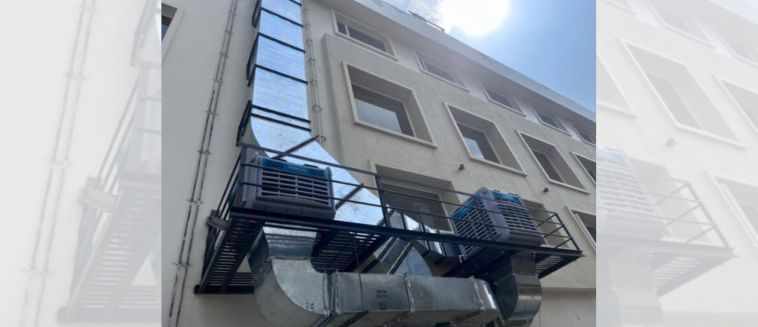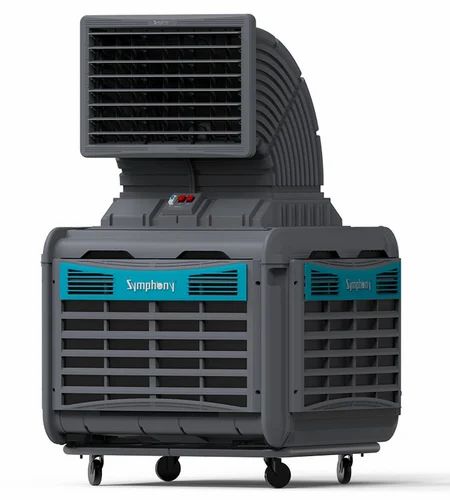The Impact of Climate on Industrial Air Cooler Performance

Industrial air coolers are essential for maintaining a comfortable and productive environment in various industrial settings. Their performance, however, can vary significantly depending on the climate in which they are used. This article explores how different climates impact industrial air cooler efficiency, identifies the best air coolers for hot and dry versus humid climates, and offers climate-specific tips to maintain optimal performance
How Different Climates Affect Air Cooler Efficiency
1. Hot and Dry Climates Hot and dry climates are often the ideal environments for industrial air coolers, particularly for industrial evaporative air coolers. These regions are characterized by low humidity, allowing air coolers to perform efficiently by utilizing the principle of evaporative cooling. The process involves drawing hot, dry air through water-saturated cooling pads. As the air passes through the pads, water evaporates, reducing the air temperature significantly before it's circulated into the space. In hot and dry climates, industrial air coolers can reduce temperatures by up to 15-20°C, making them highly effective.
This cooling efficiency is the primary reason why many manufacturers recommend industrial evaporative air coolers for such regions. The efficiency of the cooling system decreases when the air humidity increases, which is why these coolers excel in dry areas.
2. Humid Climates In humid climates, industrial air coolers face a unique challenge. Since the air is already saturated with moisture, the evaporative process becomes less effective. This results in reduced cooling efficiency because the air can't absorb as much additional moisture. In these environments, using a standard evaporative air cooler may not suffice, and more advanced systems like hybrid coolers may be necessary. These units combine evaporative cooling with additional refrigeration components to provide the necessary cooling effect.
Despite the challenges, there are specialized industrial cooling units designed to handle humid climates, which feature enhanced air circulation and dehumidification capabilities.
3. Moderate Climates In moderate climates with mild humidity and temperatures, best industrial air coolers can provide efficient cooling without any advanced systems. These regions allow for a wider range of cooler options, from traditional evaporative units to ducted air coolers. The versatility in moderate climates makes it easier to select a cost-effective solution that balances energy efficiency and cooling power.
Best Air Coolers for Hot and Dry vs. Humid Climates
Choosing the right industrial air cooler requires understanding how different models perform under specific climate conditions:
1. Best Air Coolers for Hot and Dry Climates
- Evaporative Air Coolers: These are the go-to solutions for hot and dry areas. The industrial evaporative air cooler leverages the cooling power of water evaporation to lower temperatures effectively. Symphony offers the best industrial evaporative air coolers often focus on maximizing airflow while ensuring minimal water consumption, making them both eco-friendly and efficient.
- Portable Evaporative Coolers: Portable models are suitable for spot cooling in specific areas within large facilities. These coolers are lightweight, energy-efficient, and easy to maintain.
- Heavy Duty Industrial Air Coolers: For larger areas, heavy-duty units are ideal. They are designed to handle high temperatures and provide powerful airflow, making them suitable for large-scale operations like manufacturing plants and warehouses.
2. Best Air Coolers for Humid Climates
- Hybrid Air Coolers: In humid climates, hybrid coolers can provide better performance. These coolers combine traditional evaporative cooling with compressor-driven systems that lower temperatures without relying solely on evaporation.
- Air Coolers with Dehumidifiers: Some industrial air water coolers come equipped with built-in dehumidifiers. These systems not only cool the air but also reduce humidity, making them suitable for regions with high moisture content.
- Industrial Ducting Coolers: These are ideal for humid conditions as they offer strong airflow and can be connected to a ducting system to cool multiple zones. Their ability to handle large volumes of air makes them effective in challenging climates.
Climate-Specific Tips for Maintaining Optimal Performance
To get the most out of an industrial air cooler, it is essential to follow maintenance practices that are tailored to the climate in which it is used. Below are some tips for optimizing air cooler performance in different conditions:
1. Maintenance Tips for Hot and Dry Climates
- Regularly Check and Refill Water Levels: In dry climates, water evaporates quickly, so it’s crucial to monitor and refill the water tank frequently. Many best industrial air coolers come with automated refill systems to make this easier.
- Clean Cooling Pads: Dust and mineral buildup can reduce the efficiency of cooling pads. Cleaning or replacing them every season ensures optimal performance.
- Check Airflow: Ensure that the cooler is positioned in an area with good ventilation. Proper airflow is essential to expel warm air and draw in fresh, dry air for effective cooling.

2. Maintenance Tips for Humid Climates
- Use High-Quality Cooling Pads: Opt for cooling pads designed for humid conditions, as they tend to have better absorption and allow for efficient cooling.
- Optimize Air Circulation: In humid regions, airflow plays a crucial role. Using fans in conjunction with the cooler can help distribute air evenly.
- Monitor for Mold and Mildew: High humidity can lead to mold growth on cooling pads. Regular inspections and maintenance are essential to prevent buildup, which can negatively impact the cooler’s performance.
3. Maintenance Tips for Moderate Climates
- Seasonal Maintenance: Regular seasonal checks, like cleaning filters and replacing cooling pads, can extend the lifespan of the unit. This is especially important in regions with varying humidity and temperature.
- Energy Efficiency Upgrades: Consider using programmable thermostats and automated systems to control the operation of the cooler, optimizing it for varying weather conditions.
Cost Considerations for Different Climates
The cost of industrial air coolers can vary depending on the climate and the specific features required. For instance, industrial cooler prices may be higher for units with advanced features like hybrid cooling or additional dehumidification capabilities. In dry climates, simpler evaporative models are usually sufficient, and the industrial cooler price in India tends to be more affordable for these basic systems.
On the other hand, facilities located in humid regions might need to invest in more sophisticated units. The initial cost might be higher, but the long-term benefits in terms of performance and energy efficiency often justify the investment.
Conclusion
The climate has a significant impact on the performance of industrial air coolers. Choosing the right model involves understanding the specific demands of the environment-whether it's hot and dry, humid, or moderate. By selecting a suitable industrial air cooler for home or industrial use, companies can ensure maximum efficiency, lower energy consumption, and provide a comfortable working environment. Regular maintenance tailored to climate-specific needs can further enhance the lifespan and effectiveness of the cooling solution. For businesses looking for a reliable cooling system, investing in a best industrial air cooler that matches the climate is crucial for long-term success.
From understanding the impact of climate on air cooler efficiency to selecting the right equipment, industrial operations can make informed decisions to maintain a productive and comfortable working environment. The choice of cooler, combined with proper upkeep, will ensure that the investment pays off through enhanced performance and energy savings.
